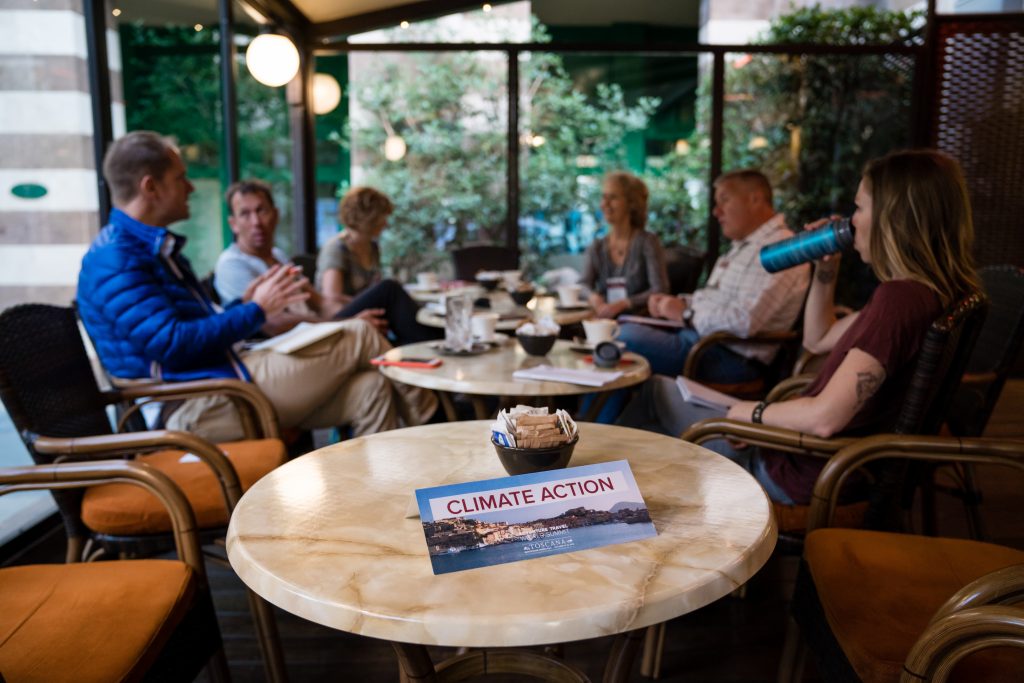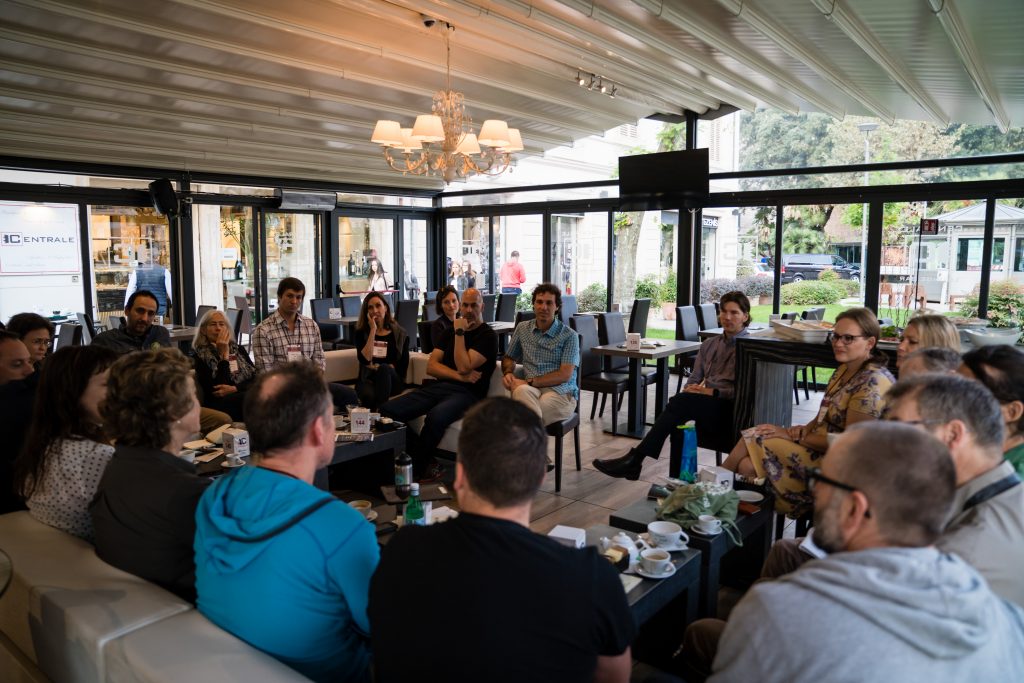Over the years, Adventure Travel Trade Association (ATTA) members and delegates at ATTA events have informally created “affinity groups” around specialized topics for which they share a passion. In designing large-scale events, it is challenging to regularly dedicate the appropriate space, time, and staff to an important, wide-reaching spectrum of topics that deserve attention. Despite the challenge, said Chris Doyle, executive director of Europe and Central Asia for the ATTA, “we understood the need to enable and empower passionate ambassador-delegates of these specialized areas to continue to carry the torch for the industry.”
At the Adventure Travel World Summit 2018, the ATTA introduced the Adventure Accelerators to capture data and ideas from these delegates to determine whether and how to enable these specialized groups to convene. Six Adventure Accelerator sessions took place early Thursday morning at the Summit, each focused on a specific topic: climate action, eliminating plastics, guide standards, Indigenous tourism, women in leadership, and young leaders.
“From early feedback, it seems the Accelerator concept hit just the right mark, allowed more freedom for discourse on extremely relevant topics, and helped to create space for the creation of specialized communities that can continue to collaborate year-round,” Doyle said. Though the ATTA team has collected detailed suggestions from the groups, highlights from each session are noted below.
Climate Action
The small group discussing climate action included delegates with many years of experience dealing with carbon offsets and climate change initiatives as well as those eager to understand the nuances of this complicated subject. In the true spirit of collaboration, those with a deeper grasp of the knowledge willingly shared their insight.

Key takeaways from the session:
- Delegates agreed that aiming for carbon neutrality isn’t enough. The industry needs to collectively find a way to move beyond offsetting and get to reduction, repair, and restoration of the environment.
- The adventure travel sector needs to hold itself accountable and it needs to involve customers in the process. This means educating and engaging clients by discussing how they can travel more efficiently and the types of questions they should be asking of the destinations they visit and the tour operators taking them there.
- Though there are some ATTA members doing significant work in climate action, their stories and learnings need to be shared. The industry needs to identify destinations and operators making meaningful efforts to offset and reduce their emissions and environmental footprint across their entire product range so others can follow their progress.
Eliminating Plastics
Several delegates grappled with the adventure travel industry’s responsibility related to eliminating plastic. Over the course of the pragmatic conversation, delegates offered insight into their individual efforts and generated realistic ideas and plans to continue this discussion.
Key takeaways from the session:
- The adventure travel industry lacks awareness, research, education, and tools to address the issue. Delegates seek benchmark research and statistics within the industry in order to monitor their own contributions and create short-, mid-, and long-term strategies including a system to measure and benchmark the industry’s progress.
- There are an incredible number of obstacles tied in with eliminating plastics that need to be considered including societal buy-in, access to clean water, traveler concerns about waterborne illnesses, time required for change, and the inherent structure of adventure tourism that doesn’t work within a single “closed” environment like cruise ships or all-inclusive resorts.
- All stakeholders are ready to put competition aside and collaborate. Delegates firmly stated strategic solutions currently being used to eliminate plastics are not proprietary and should be shared immediately; they all committed to sharing support, ideas, and resources to tackle the issue (it’s worth noting no destination representatives were present at the session). All links and stakeholders in the supply and value chain need to be involved in the process from the very beginning.
Guide Standards
The passionate group meeting to discuss guide standards included many ATTA members who have been involved in this conversation for several years. This initiative started with an idea in the early days of the Adventure Travel World Summit and has grown into an international guide standard and training program that now touches many corners of the globe, and it continues to evolve.
Key takeaways from the session:
- Guides play a crucial role in fulfilling adventure travel initiatives: They are on the frontlines documenting human trafficking and poaching, demonstrating sustainable principles, and interfacing with the environment and local communities. Possibly most importantly, guides facilitate the life-changing experiences travelers have and, hopefully, inspire them to take additional action on these initiatives when they return home.
- The ATTA convened the community that documented these guidelines for excellence in guiding and continues to take an active role in promoting the Adventure Travel Guide Standard (ATGS). Volunteers and other passionate people in the community have stepped up over the years to elevate this initiative.
- Establishing global standards for the industry is a key initiative to support qualification programs at the country level. An example of this is AdventurePro, a capacity-building program the ATTA is implementing in Jordan based on standards, training the trainers, and certification.
Indigenous Tourism
Twenty delegates representing several countries discussed this increasingly important form of travel. There is often a disconnect between what is being shown or promised with what a community wants to share, and those in the adventure travel industry need to work toward bridging this divide.

Key takeaways from the session:
- In discussing what the ATTA community can do to support positive growth in Indigenous tourism globally, delegates were concerned there is a lack of sharing best practices. People need to beware of non-Indigenous tour operators and marketers deciding what will “sell.” Further, those in the industry need to respect that, what some see as “tourism” is actually Indigenous people working and making a living for themselves. Care should be taken to avoid hindering people’s ability to make a living by deciding it is more important as tourism.
- The industry needs to combat stereotypes. It is important to not “embellish” for a better story versus what is truly authentic. It isn’t up to non-Indigenous people to determine what stories should be told; rather, they need to help Indigenous communities find their own voices.
- The group noted there is an opportunity to expand Indigenous presence in Sweden at the Adventure Travel World Summit in 2019. Delegates offered several suggestions to the ATTA to consider while organizing the 2019 annual event.
Women in Leadership
The nine women who attended this Adventure Accelerator came to the table prepared and willing to discuss any relevant topics. In general, session delegates were managers and business owners who wanted to learn from each other and develop skills they could use to mentor and develop their direct reports into strong leaders.
Key takeaways from the session:
- Women continue to struggle with being fun and relatable while also commanding respect. Further, they find it challenging to create confidence in upcoming generations of girls and women.
- Some of the delegates noted external factors that are also difficult such as national leaders that don’t empower women and working in countries where it is difficult to position and promote their professional endeavors.
- Delegates shared inspiring stories as well. One noted her suggestions of including more women on the company’s board of directors was heeded. Another said she quit her job to start her own company in order to have a deeper impact on women and travel.
Young Leaders
The Adventure Accelerator focused on young leaders drew representatives from the private sector, public sector, and media. It was an active and dynamic conversation that touched on drawing young(er) professionals and entrepreneurs to shape them as the travel industry’s future leaders. This is new generation has a different value system and fresh ways of thinking when it comes to career and personal growth.
Key takeaways from the session:
- Tourism professionals working in the public and private sectors need to be aware younger employees can help companies understand and access this younger generation. Seasoned product development and marketing strategies won’t necessarily meet the needs of new generations of travelers. Destinations and companies should engage more young people to help design new-generation brands and strategies that speak to and need to be developed to reach younger clientele.
- Delegates shared ideas for how the ATTA can play a role in empowering young leaders such as including young(er) speakers at events, hosting events focused on young(er) generations, and partnering with universities and youth organisations to establish a channel of communication with young(er) generations so they can see there are professional adventure travel opportunities beyond guiding.
- The young(er) generation includes entrepreneurs and innovators who have already launched disruptive travel-related companies. It is important to support innovative thinking that leads to new business models, new ways of meeting traveler needs, and new solutions for the industry’s challenges such as sustainability and inclusiveness. One way of encouraging these innovative processes is through two-sided mentor programs where young(er) generations can help refresh existing businesses with their thinking and current industry “veterans” can help nurture future leaders by sharing their experiences.
